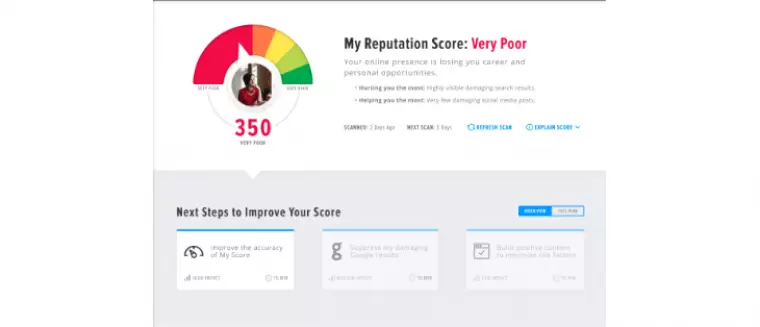With so much riding on our online reputations, it comes as no surprise that people are looking for ways to clean up their digital footprint. Step in BrandYourself.com; a New York-based firm that recently secured funding from Peter Jones on Dragon's Den, aims to help people quickly and efficiently clean up their public image.
Helping you clean up your image
Your digital footprint tells a story about who you are. It is a publicly available record of your history and it pulls no punches. Your online persona or "brand" is extremely important, and it can easily advance your career options.
On the other hand, your digital footprint can severely damage your reputation. One poorly chosen social media comment here, or a concerning photograph there, could be enough to cost you a valuable opportunity.
Of course, there is always the option to delete all your social media accounts. Sadly, this could actually backfire. Nowadays, colleges, universities, and employers all analyze people’s social media presence to gain insights. No social media presence is actually considered a red flag.

The BrandYourself service plays directly into people's desires to exert more control over their data. And, by the looks of it, it is already winning consumers over. Last year alone it turned over more than $4 million and it has already been through a series of investments that demonstrate the popularity of its concept.
Speaking about the service Patrick Ambron CEO and co-founder of BrandYourself told ProPrivacy.com:
“From a mission standpoint, our goal is to help people with their privacy and reputation online. You can’t avoid having an online presence, because even if you actively avoid it other people are tagging you - you have one - and you kind of need one to live in today’s modern world. That opens you up to reputation and privacy issues, and that’s not a good thing in our eyes and we are trying to help people with it.”
So, how does BrandYourself work?
First, the firm’s technology scours the net and identifies “risk factors” that could be damaging its users' reputation. Next, it walks them through the process of finding and deleting inappropriate photos, social media entries, blog posts, articles - and other negative online media - that could potentially harm their public image.
On the surface, the idea of helping people to clean up their digital footprint appears to be a noble cause. The big question, however, is whether investors are flocking to the service on merit alone? Or whether BrandYourself.com has a more sinister, hidden rationale, that is causing investors to rub their hands together?

Invasive technology
Facebook, Twitter, Google, etc. are all considered invasive enough on their own - so what happens when you ask a service to analyze them all? The simple answer is that BrandYourself could easily be gaining a powerful insight into its subscribers. BrandYourself could use that data to make staggeringly detailed secondary inferences, as is the case with Facebook.
Even though BrandYourself enables people to clean up their online presence - it theoretically still knows what people's digital footprint was in the first place. What’s more, the BrandYourself privacy policy suggests that it may keep a record of that data - thereby becoming the new digital overlord that is privy to all its subscribers' past secrets. From section 3.1 of the privacy policy:
“BrandYourself collects Personal Information regarding its current, prospective, and former clients, customers, users, visitors, and guests.”
Disturbing policies
Section 3.1 of the policy suggests that even if subscribers stop paying for the service, BrandYourself could continue to retain (and process) their data. A closer look at the policy appears to reveal why...
BrandYourself gives itself permission to collect a huge amount of personal data from its users. This includes information about their (IP) address, cookie identifiers, ISP or mobile carrier, mobile advertising identifiers, MAC address, IMEI, Advertiser ID, geolocation information, hardware type, operating system, Internet service provider, and “other device identifiers and features that are automatically assigned to your computer or device when you access the Internet."
That is a massive treasure trove of data, that, alongside everything else it learns about subscribers, could easily be used to create a revenue stream (via advertising, marketing, and selling the data). The policy suggests that it might indeed use data in this way:
“BrandYourself may use Personal Information to provide you with materials about offers, products, and Services that may be of interest, including new content or Services. BrandYourself may provide you with these materials by phone, postal mail, facsimile, or email, as permitted by applicable law. Such uses include:
-
To tailor content, advertisements, and offers
-
To notify you about offers, products, and services that may be of interest to you
-
To provide Services to you and our sponsors”

Now consider that a number of the venture capital firms that have already invested in BrandYourself have existing links to advertising, marketing, data processing and analysis, medical data analysis and many other tech-related industries that stand to profit from people's personal data.
As if that wasn’t enough, BrandYourself gives itself permission to analyze people’s “private messages.” It also informs users that they must agree to have their intellectual property stolen:
“You agree that BrandYourself is free to use the content of any communications submitted by you via the Services, including any ideas, inventions, concepts, techniques, or know-how disclosed therein, for any purpose including developing, manufacturing, and/or marketing goods or Services."
Add all of that to section 6.1 of the Terms of Service, and it becomes pretty obvious that there is cause for concern:
“Your License to BrandYourself
As between you and BrandYourself, you own the content and information that you submit or post to the Services and you are only granting BrandYourself and our affiliates the following non-exclusive license: a worldwide, transferable and sublicensable right to use, copy, modify, distribute, publish, and process, information and content that you provide through our Services, without any further consent, notice and/or compensation to you or others.”

What the firm had to say
Patrick Ambron, CEO and co-founder of BrandYourself, told ProPrivacy.com that despite the problematic language found throughout the privacy policy, subscribers do not need to worry. Ambron told me:
“We’ve been around since 2009 and we haven’t and never will monetize data as long as I am CEO. [...] The only revenue stream we’ve ever had is the subscription model.”
Of course, you have to take that comment on faith and Ambron did also divulge during the interview that 60% of the firm is now held by private investors so he may not always have the final say on the future direction of the company. He also admitted that “the privacy policy could allow me to change my mind tomorrow.”
To his credit, Ambron did appear to be talking honestly during the interview. He also held steadfast under pressure - claiming that the firm was not handling the vast amounts of data specified in the privacy policy. However, he agreed that the overly broad privacy policy does not clearly spell out to consumers what they can expect to happen to their data once it is in BrandYourself’s hands:
“Here is our philosophy, here’s what we’ve done, here’s what I can show you, but, to your point, the other end is that if I don’t spell that out in the privacy policy it allows me to change my mind, and I think you’re exactly right.”
“The privacy policy we have would theoretically allow us to do exactly what you are saying, right, build some sort of revenue stream on data.”
Despite these frank comments, Ambron urged me to remember that the data BrandYourself accesses is only data that has already been posted elsewhere. This, he feels, makes it less valuable. As to why the policy is so broad? Ambron told me:
"The legal standpoint of why our policy was written so broadly is to just cover any sort of case if someone claims that we technically broke their privacy thing litigiously.”
Again, Ambron admitted that: “Our privacy policy doesn’t align with the way we operate and the way I’m saying we operate.”
Beware the gatekeeper
People deserve the right to properly control their online presence. And, there is no doubt that once people's data is online it can be extremely hard to clean up. BrandYourself appears to offer a valid solution, that instantly appeals to people’s desire for control. If it weren't for the alarmingly broad privacy policy, the service could be pretty useful.
On the other hand, it seems to us that the best way to clear up your online history is to go ahead and do it yourself. Doing this limits the points of contact that are granted access to your personal data, information, and photos.
BrandYourself may seem like an excellent method for discovering things about yourself online. However, in reality, it just searches the first three pages of Google and asks you to pay for it to search through all your accounts.
Letting yet another company learn massive amounts of information about you and giving it permission to process, retain, and profit from that data - seems counterintuitive to the intended desire for improved digital privacy.
Ambron told us that he would investigate ways to improve the privacy policy going forward, and that he would contact us if anything substantial changed. In the meantime, I recommend users err on the side of caution. If the policy ever changes, BrandYourself could become a useful and trustworthy service. Until such a time... (to quote the dragons) I'm out.
*UPDATE*
Following our conversation Patrick Ambron reached out to me with the following statement:
| "I've already reached out to our legal team based on what we spoke about. After the Holiday here in the US, we plan to take a look at our privacy policy and see if we can make it more accurately reflect the way we operate and our overall philosophy on privacy. We've never monetized user Data because we care about user privacy and transparency so I would love for our policy to reflect that.") |
Image credits: press pack from brandyourself.com, policy image taken from brandyourself.com's privacy policy,
